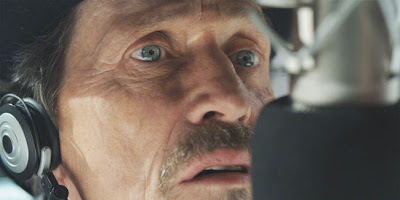
It is true of films as it is of people that they can be too smart for their own good. They utilise their cleverness to outsmart you, leaving you befuddled and – maybe – impressed, but certainly not rewarded. As a result of successes such as ‘The Usual Suspects’ and ‘The Sixth Sense’ the last fifteen years have seen the prevalence of the “twist ending” grow, such reversals inevitably becoming either rote and expected or unfathomable and bewildering. It is a rare film (and, indeed, person) that employs cleverness not to outwit you but to reward you, and that has enough faith to methodically reveal its treasures without feeling the need to hurriedly pull the rug from under you lest you become fidgety.
‘Pontypool’ is such a prize experience, and even if it did not feature a mesmerising central performance, subtly rich atmospherics and confident use of a small budget, it would deserve acclaim simply for thinking its ideas through properly and trusting the strength of an interesting concept.
It would be discourteous to speak too much about what these ideas are, as coming to the film cold is a distinct advantage, even though it lacks overt narrative surprises. Suffice to say that it is set in the radio booth of a local station for a small Canadian town, into which strange reports come concerning the behaviour of the locals. Rather than venture beyond the borders of the converted church of Radio 660 the film instead becomes tighter, more claustrophobic, genuinely engrossing and quietly horrific.
“Mrs French’s cat is missing…” intones Stephen McHattie’s Grant Mazzy in the film’s opening, and his gravel-hued voice subsequently offers the viewer what seems a solid anchor, even as more and more clues suggest that it is language that is what should be feared in this world.
We return to the missing cat several times in the film in ways which are easy to overlook: this is just one subtle repeated idea which is used to provide a structure which, the more it is developed, questions the very nature of structure itself. Does the repetition of an idea create meaning or destroy it? Familiarity is vital to successful discourse, and rhetoric thrives on repetition, so what would be the consequences of a requirement to de-familiarise oneself from the things that, arbitrarily, are concrete?
These might be strange questions, and I am being purposefully vague, but it is clear ‘Pontypool’ is playing games with the idea of apocalypticism, and the film would be best read with recourse to James Berger’s rewarding book-length study of end-time thinking ‘After The End.’ In it, Berger speaks of the trauma of the apocalypse rendering the event itself unreadable, and texts from the Bible onwards cop out by conceiving of the post-apocalyptic in pre-apocalyptic ways: in the Book of Revelation, when an angel “measures the new Jerusalem, it uses preapocalyptic, human measures.” It should be left to another reviewer less cautious of spoilers to investigate the film as it relates to Jacques Derrida’s concept of language and the “absent referent”, but ‘Pontypool’ should certainly be seen as grappling with serious issues regarding apocalypticism, a way of thinking which can so easily lead to lazy satire (‘Zombieland’) or unenlightening teleological religiosity (‘I Am Legend’).
If such sociological enquiry fails to get your blood pumping, then never fear – there are plenty of well-handled shock moments, including a nasty ‘cold-turkey’ sequence which, apart from its overwrought punch line, is quietly but pervasively upsetting. These and other moments of tension are insidiously effective, and make ‘Pontypool’ one of the best films I have seen in recent years. Seek it out. Just make sure when in company who have yet to see it you force yourself to be as tight-lipped as the tagline demands: “Shut Up Or Die!”
No comments:
Post a Comment